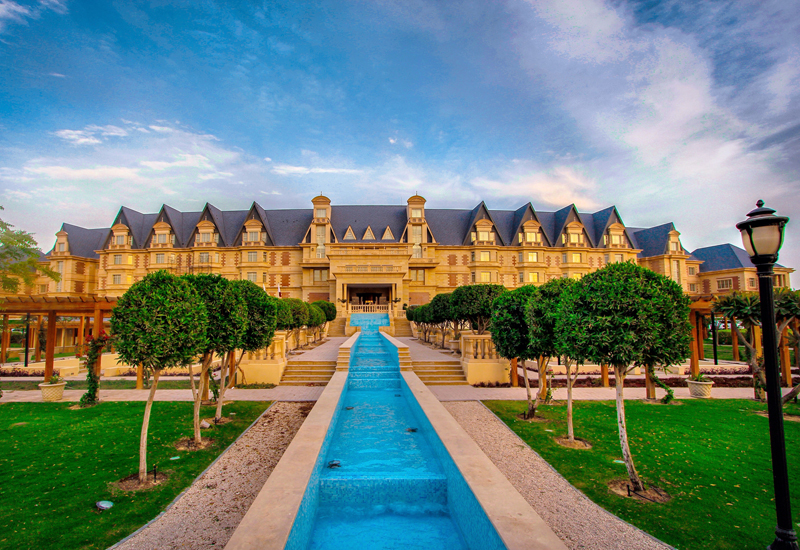The Grand Heritage was officially re-flagged as the Mövenpick Al Aziziyah in May this year, becoming the company’s third operational property in Doha, Qatar. For everyone at the property involved in the rebranding, the experience has been described as a “smooth transition” from old to new.
The hotel’s general manager, Peter Beat, says: “Since its inception, the property was popular amongst Qataris and GCC guests; and it was not anyone’s intention to come in and change too much. We want to build on the success of what the hotel has done.”
The ExCom team describes the hotel’s exterior structure and interior décor similar to that of “a century-old English castle” and Beat adds to the sentiments of his colleagues. “It’s a beautiful product; it’s quite unique for that sort of a building structure in the middle of so much greenery, something you would never expect in Doha.”
Mövenpick Al Aziziyah is located in the Aspire Zone, a 250-hectare dedicated sports city in Doha’s Al Waab district, which was constructed for the 2006 Asian Games. The complex features sporting facilities, mainly geared towards football, and also houses a speciality sports medicine facility — Aspitar. The complex is also the site of one of the FIFA World Cup stadiums, that’s set to be held in Qatar in 2022.
The hotel, hence, serves as a crucial cog in the complex’s offerings and is frequented by sports teams throughout the year. Director of business development Musa Al Nammari tells Hotelier Qatar: “During the winter months, we have a good reputation with the European sports clubs such as Bayern Munich, Paris St. German and Zenit St. Petersburg, to name a few, that stay here.”
He adds: “We have Saudi Arabia’s Al Ahli Football Club staying with us in October, in addition to local teams that come to use the training facilities. Every week we have an average of two to three football teams [staying with us]. We are talking about only one sport — football. Then there are other sports teams and individual athletes who stay here as well.”
“Being part of Aspire, we are in close coordination with them, since we are facilitating their plan and represent the government. We are doing great in terms of rooms and occupancy,” he adds.
Beat says: “In terms of sport groups, it’s two-fold — one way is to collaborate with Aspire Zone. We work closely with them and they help us to get some teams to stay with us. The second layer is where we directly approach teams and managements with marketing and sales efforts, sometimes through our regional sales office. For instance, our office in Saudi Arabia is approaching various football teams within the Kingdom. As we speak, we have two teams from Saudi Arabia staying with us. Similarly, we use our offices in London [to attract business] from Europe.”
Most of the ExCom team was retained from the previous management, with the exception of Beat who joined the property mid-May this year.
Executive chef Michel Soulet joined the property almost two years ago, after spending close to five years working for the Marco Polo Group in China. Soulet shares his assessment of the rebranding: “We have four F&B outlets at the hotel — Flavours, Blue, Agora and Victoria Tea Lounge. And, we have not changed the restaurants, they are the same. The owning company has not changed; you just change the operator, and you cannot change a restaurant at the flick of a finger. It takes a bit of time to decide what we really want to do.”
Rawad Mahassen works as the outlets manager and says that the hotel is preferred by sports teams for the flexibility offered with its F&B services. “We have packages in place for sports teams as most of our business comes from them. They like the hotel, the restaurants and the quality of the food. We are now also implementing Mövenpick’s healthy menus for the teams, as well as other guests.
Al Nammari says: Clubs have very specific menus and requirements, which includes the local and GCC clubs. Normally, they ask to meet with the chef and F&B director [prior to their stay at the hotel]. Mostly, our chef anticipates their requirement in advance, even though every coach has a different programme.”
Soulet tells Hotelier Qatar that most teams travel along with their dieticians and doctors. “We tailor the menu as per their needs.” He also says that no two teams have the same diet and requirements. “It’s down to juggling different items, perspectives and we are flexible enough to accommodate these,” he adds.

| Advertisement |









 Search our database of more than 2,700 industry companies
Search our database of more than 2,700 industry companies









